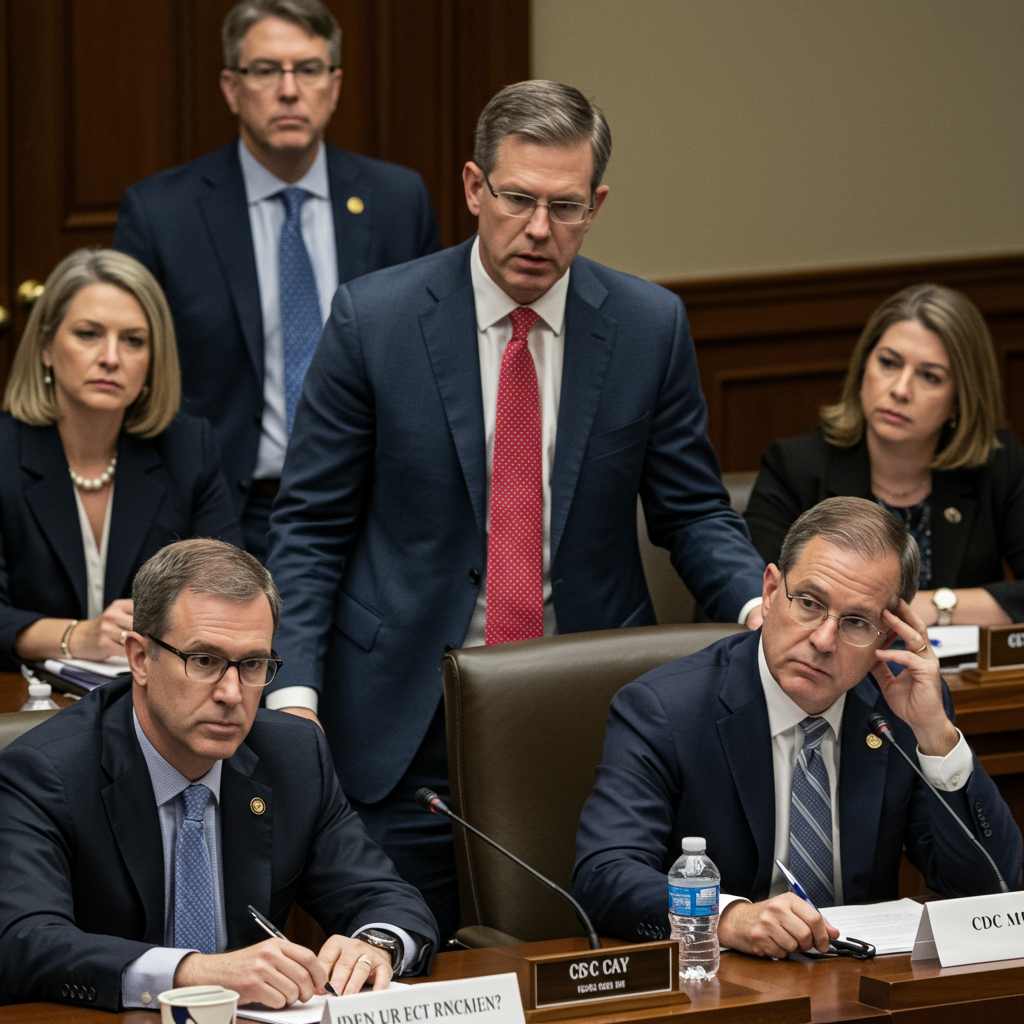Concerns are mounting among public health experts following the initial meeting of newly appointed members to the CDC’s influential Advisory Committee on Immunization Practices (ACIP). Rather than engaging in substantive scientific debate, observers noted the session saw panelists repeatedly raise previously settled issues and ask fundamental questions about established public health methods. This raised red flags about the level of relevant expertise among the new committee members.
Seasoned professionals voiced dismay over discussions that seemed more akin to basic epidemiology lessons than a high-level advisory meeting. This perceived lack of foundational knowledge by some members is sparking worry regarding the committee’s ability to provide sound guidance on critical vaccine matters impacting national public health.
Expertise Questioned on Core Scientific Concepts
Experts specifically highlighted instances where new ACIP members appeared unfamiliar with standard epidemiological practices. James Lawler, MD, MPH, from the University of Nebraska Medical Center, expressed deep disappointment, stating the level of questioning felt elementary. He remarked that some members seemed to require basic explanations of principles widely understood within the field, finding it “embarrassing” and saddening for the nation’s scientific standing.
A key point of contention arose during a discussion on COVID-19 vaccine effectiveness studies. Panelist Retsef Levi, PhD, an operations management professor at MIT, questioned the validity of the test-negative study design used by the CDC. Dr. Levi speculated that this method might oversample vaccinated individuals or even suggested vaccines could increase vulnerability to viruses, presenting this as an “alternative explanation” for vaccinated people appearing in studies of hospitalized patients.
Ruth Link-Gelles, PhD, MPH, who leads the CDC’s vaccine effectiveness research, explained that test-negative studies often focus on populations, such as older adults hospitalized with respiratory illness, who inherently have high vaccination rates. This inherent demographic characteristic, she clarified, naturally leads to a high proportion of vaccinated individuals among both cases and controls, not a bias in the study design itself. Dr. Lawler reinforced this point, explaining that seeing a high percentage of vaccinated people hospitalized reflects the overall high vaccination coverage in that vulnerable population group, not a flaw in the epidemiological approach. He underscored that Dr. Levi’s questioning demonstrated a misunderstanding of fundamental epidemiological principles.
Calls for Randomized Controlled Trials Decried
Another area where expertise seemed lacking was in demands for randomized controlled trials (RCTs) for currently available COVID-19 vaccines. While RCTs are the gold standard for establishing initial efficacy, experts explained they aren’t always practical or ethical for ongoing public health evaluation, especially years into a pandemic with widespread vaccine availability.
Dr. Lawler pointed out the practical limitations of conducting new, large-scale RCTs for existing vaccines. He cited the significant time, cost, and ethical dilemmas involved, particularly questioning the ethics of randomizing high-risk individuals to a placebo group now. He emphasized that initial vaccine RCTs provided crucial early data, which subsequent, less resource-intensive methods like test-negative and prospective cohort studies consistently confirmed. This layering of data from different study types provides a robust, consistent picture of vaccine performance over time.
Despite this, Tracy Beth Høeg, MD, PhD, an FDA ex officio ACIP member, expressed a desire for RCTs to minimize bias, suggesting that without them, one might wonder if the data is misleading. Dr. Lawler countered this perspective definitively, stating that no experienced epidemiologist or infectious disease expert would find the CDC’s vaccine effectiveness data misleading. He characterized these arguments as not “serious, legitimate arguments” from individuals who truly understand vaccine science and evaluation methods.
Rehashed Controversies Distract From Current Issues
Beyond methodological questions, panelists spent time revisiting topics long considered settled within the scientific community. These included renewed discussions about thimerosal, a mercury-containing preservative once used in some vaccines, and the combined measles, mumps, rubella, and varicella (MMRV) vaccine.
For instance, Robert Malone, MD, raised the unsubstantiated claim that “hot lots” of COVID vaccines caused more severe side effects. Dr. Levi also suggested that vaccines drove the evolution of new COVID variants, a notion contradicted by the fact that variants like Delta emerged before widespread vaccine availability. Dr. Lawler specifically noted the Delta variant’s appearance predated broad vaccine use.
Paul Offit, MD, a well-respected vaccinologist from the Children’s Hospital of Philadelphia, offered a historical perspective. He noted the measles vaccine has been in use for over 60 years without causing viral changes, illustrating that widespread vaccine use doesn’t typically lead to such evolutionary pressure on viruses. He drew a parallel to COVID-19, stating that despite high vaccination rates, the vaccines continue to be effective against the virus.
Even Cody Meissner, MD, the sole panelist with expertise in infectious diseases and pediatrics, brought up the distinction between dying “from” versus “with” COVID-19. Experts like Dr. Lawler and Dr. Offit noted this specific concern is less relevant for the current season and pointed to earlier studies confirming that most hospitalized COVID-positive deaths were indeed caused by the virus. Dr. Meissner also referred to COVID as a “rare illness” in children, which Dr. Offit challenged by citing the thousands of pediatric deaths and bereaved families in the US over the past five years.
Re-Litigating Settled Vaccine Safety Concerns
The topic of thimerosal was introduced via a presentation by Lyn Redwood, RN, associated with groups that have alleged a link between vaccines and autism – a claim overwhelmingly refuted by extensive scientific research. Dr. Offit and others highlighted that thimerosal is now present in only a small percentage of annual flu shots, making the discussion largely irrelevant to current vaccine safety. Dr. Meissner himself acknowledged the issue was “old” and previously addressed, expressing uncertainty on how to respond to the presentation. A planned CDC presentation on thimerosal was reportedly removed from the meeting website, adding another layer of confusion.
Similarly, Martin Kulldorff, PhD, presented on the MMRV vaccine, despite acknowledging that the CDC has recommended separate MMR and varicella shots for the first dose since 2009. Experts questioned the necessity of revisiting this topic when separate administration is already standard practice for most pediatricians.
Broader Context: Appointments and Political Concerns
The concerns about the new ACIP members’ qualifications are not isolated. As external reports indicate, Senator Bill Cassidy (R-La.), a physician himself, publicly called for postponing the meeting due to worries about the appointees’ lack of relevant experience in fields like microbiology, epidemiology, or immunology. Senator Cassidy, chairing the Senate HELP Committee, specifically questioned if new members possessed sufficient experience with modern technologies like mRNA vaccines and whether they held potential biases.
These appointments were made by Health and Human Services Secretary Robert F. Kennedy Jr., who controversially dismissed the entire previous 17-member ACIP committee. Mr. Kennedy Jr. defended this action by stating a “clean sweep” was needed to rebuild public confidence in vaccine science. However, among the new appointees are individuals, including Robert Malone, known for promoting COVID-19 conspiracy theories. Senator Cassidy, despite having questioned Mr. Kennedy Jr.’s well-documented vaccine skepticism during confirmation hearings, ultimately voted to approve his nomination for HHS Secretary.
Medical organizations, including the American Academy of Pediatrics and the Pediatric Infectious Diseases Society, also signaled concerns, with several choosing not to send representatives to the meeting. While the Infectious Diseases Society of America stated their absence wasn’t a boycott, they noted liaisons were invited only hours before the meeting commenced, posing practical challenges.
Impact on Public Trust and Policy
Experts warn that allowing fundamental scientific principles to be debated or settled issues to be re-litigated by individuals lacking core expertise undermines the crucial work of the ACIP. Dr. Lawler noted that while some arguments raised might sound plausible to someone without specialized knowledge, they often lack grounding in data and science, serving only to foster doubt and erode public confidence in vaccines.
Dr. Offit starkly contrasted the current situation with the past, lamenting the dismissal of experienced experts. He argued that the country has lost valuable expertise and now has individuals with historical anti-vaccine stances influencing public health policy, a role they previously held only “shouting from the sidelines.” The ACIP’s recommendations are vital, forming the basis for CDC guidelines on vaccine use nationwide. Doubts cast on the committee’s scientific rigor due to member qualifications could significantly impact public trust and vaccine uptake, potentially hindering efforts to control infectious diseases.
Frequently Asked Questions
Why did experts criticize the new ACIP members after their first meeting?
Public health experts voiced concerns that several newly appointed ACIP members demonstrated a lack of fundamental understanding in core areas like epidemiology and infectious disease science. They noted members asking basic questions about established methods like test-negative studies and re-litigating long-settled issues such as thimerosal safety and the MMRV vaccine, suggesting insufficient relevant background for their roles on the key federal vaccine advisory committee.
Who appoints ACIP members and why is relevant expertise important for this role?
ACIP members are appointed by the Secretary of Health and Human Services. Their expertise is crucial because the committee develops recommendations on how vaccines should be used in the United States. These recommendations, once approved by the CDC Director, become official public health policy. Members require deep knowledge of immunology, epidemiology, infectious diseases, and public health to evaluate complex scientific data and provide sound, evidence-based guidance that protects national health.
How might perceived lack of expertise on the ACIP affect public trust in vaccine recommendations?
Experts warn that if the ACIP committee includes members who appear unfamiliar with vaccine science or who promote unsubstantiated claims, it can undermine public confidence in the committee’s recommendations and, by extension, in vaccines themselves. Raising previously debunked safety concerns or questioning established scientific methods without a strong basis in data can create doubt and skepticism, potentially leading to lower vaccine uptake and increased vulnerability to preventable diseases.
Conclusion
The initial meeting of the revamped ACIP has raised significant concerns among the scientific and public health communities. Questions about fundamental concepts and the rehash of settled controversies suggest a potential deficit in relevant expertise among some new members. This situation is exacerbated by the political context surrounding the appointments and the dismissal of experienced previous members. Experts worry that a lack of deep scientific understanding on this critical federal committee could erode public trust in vaccine recommendations and ultimately impact the nation’s ability to manage infectious diseases effectively. The coming meetings will be closely watched to see if the committee can move past foundational issues and engage in the rigorous, evidence-based discussions required for its vital public health mission.



